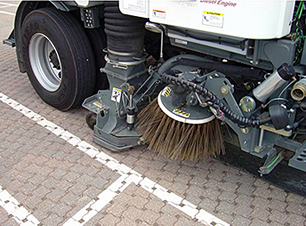Permeable Pavement Maintenance
 GENERAL MAINTENANCE GUIDANCE
GENERAL MAINTENANCE GUIDANCE
As with all types of permeable and pervious pavements, permeable interlocking concrete pavements (PICP) are subject to sediment, fines and other debris accumulating on the surface, which can slow infiltration over time. As a result, it is recommended that the pavement be inspected and periodically cleaned to help ensure that the desired infiltration rates are maintained. Some municipalities may stipulate sweeping frequency.
The rate of sedimentation will vary depending on the amount of traffic and whether sediment is deposited onto the pavement from adjacent areas. Some PICPs may not require cleaning for several years as they remain capable of adequate infiltration. Research has demonstrated that sediment tends to be trapped at the surface in the joints and openings, which allows for removal by street sweeping/vacuuming equipment.
WINTER MAINTENANCE
Over twenty years of experience in areas such as Toronto, Chicago, Calgary, and New England have demonstrated that PICP can be used successfully in cold climates. The pavement base and soil subgrade drain prior to freezing and the air in the aggregate voids offer some insulating effect, while the moisture and the earth provide some heat to delay freezing of the soil subgrade and base/subbase so that they can drain prior to freezing. However, should water freeze in the base/subbase, the pavement does not heave due to sufficient space in the aggregate voids for expansion.
 UNI® permeable pavements can be snow plowed just as with any other pavement. Tests have shown a benefit of all permeable pavements is that any snow remaining after plowing can melt and drain through the surface as temperatures rise, thus reducing or eliminating refreezing of water at night and reducing slip and skid hazards. In addition, research at the Toronto and Region Conservation Authority and the University of New Hampshire has shown that the use of deicing salts can be reduced with permeable pavements. This provides added environmental benefits. Winter sanding of PICP is not recommended as it will speed up clogging. Instead, if needed, use No. 8, 89 or 9 stone for traction as these materials are typical of jointing and drainage opening fill.
UNI® permeable pavements can be snow plowed just as with any other pavement. Tests have shown a benefit of all permeable pavements is that any snow remaining after plowing can melt and drain through the surface as temperatures rise, thus reducing or eliminating refreezing of water at night and reducing slip and skid hazards. In addition, research at the Toronto and Region Conservation Authority and the University of New Hampshire has shown that the use of deicing salts can be reduced with permeable pavements. This provides added environmental benefits. Winter sanding of PICP is not recommended as it will speed up clogging. Instead, if needed, use No. 8, 89 or 9 stone for traction as these materials are typical of jointing and drainage opening fill.
INSPECTION AND MAINTENANCE TASKS
It is recommended that PICP be inspected at least once a year to ensure the pavement surface is infiltrating. An easy way to do this is simply to observe if there is standing water after storms. Also, surface infiltration tests may be conducted using C1781 Standard Test Method for Surface Infiltration Rate of Permeable Unit Pavement Systems. Stormwater maintenance agreements are sometimes used to determine inspection and cleaning frequency.
For more detailed information:
ECO-STONE MAINTENANCE GUIDANCE SHEET
Quick Links
- Traditional and Permeable Galleries
- Traditional Pavers
- Permeable Pavers
- Eco-Stone Family of Permeable Interlocking Concrete Pavers Project Profiles
- NEW! Street, Large-Scale and Industrial Pavements
- Installation and Specifications
- Design Manuals and Literature
- Software and Presentations
- Articles and Case Studies
- Cross-Sections
- Videos
- Visit our Downloads page to access over 175 items in one place, including design manuals, case studies, articles, research papers and more

